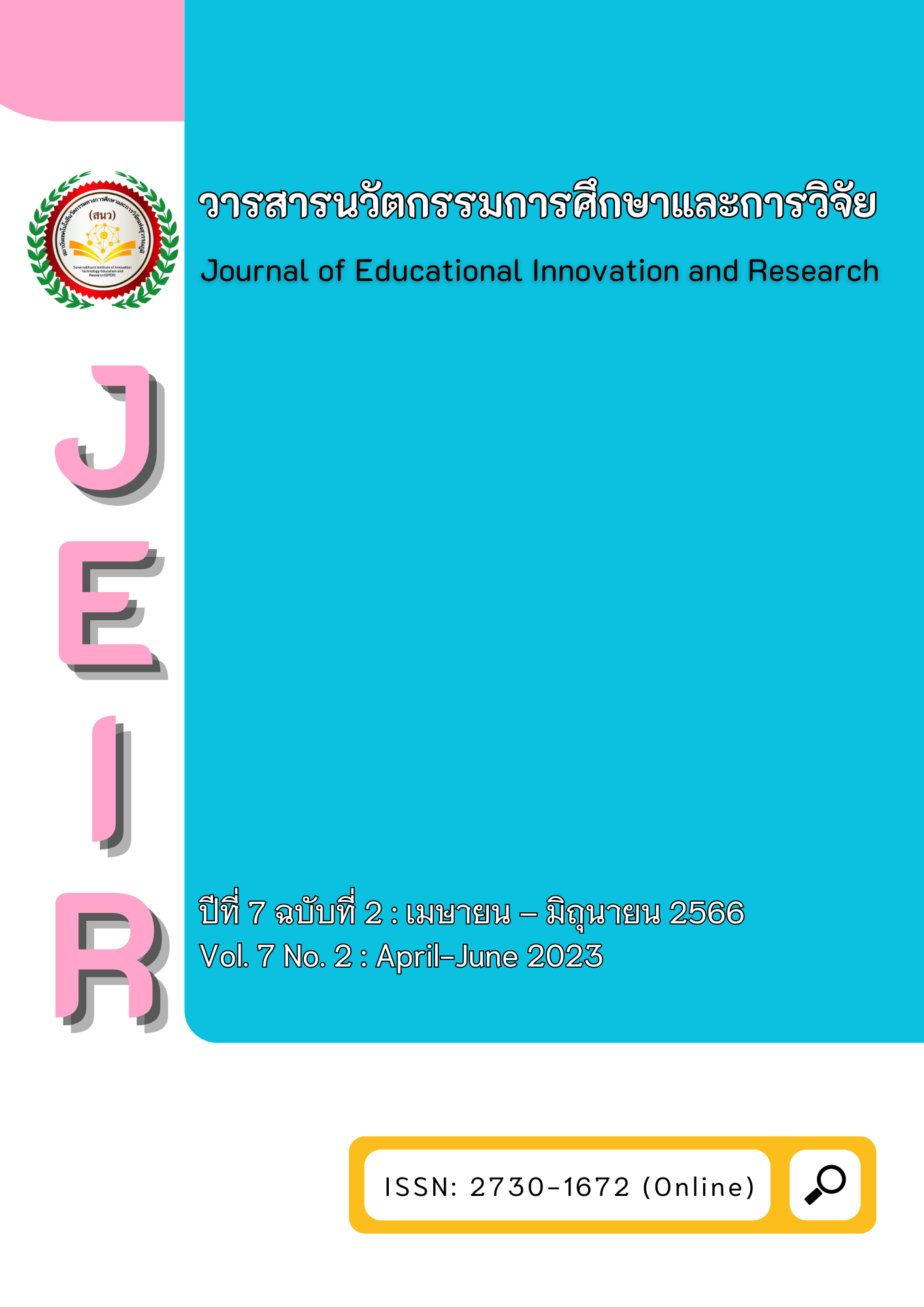A Relational Model of Organizational Environment, Organizational Resilience, and Work Performance in the Hotel Industry of China Under the Covid-19ERA
Main Article Content
บทคัดย่อ
This article aimed to study the hotel employees' perceptions of hotel organizational culture, organizational commitment, work motivation, self-efficacy, incident intensity (COVID-19, and organizational resilience, and investigated their relationships to hotel employees' work performance under the COVID-19 era. The researchers discuss in detail the operation of the structure and the examination of the questionnaire content.
The sample was hotel employees in Fujian Province, China. They were collected by the snowball sampling method. The instrument for collecting data was the questionnaire. Descriptive statistics are first used to show the composition of the sample population and their perception of various survey variables. Then, through confirmatory factor analysis and the tests of convergent validity and discriminant validity of each variable, the construction validity of the scale is comprehensively judged. Finally, the structural equation model is tested by fitting, and on this basis, the path analysis is carried out to test whether the hypothesis and organizational resilience play a mediating role in the path.
The results show that organizational culture, organizational commitment, motivation, self-efficacy, and event intensity have significant effects on organizational performance in the context of COVID-19. Organizational resilience mediates the effects of organizational commitment, motivation, self-efficacy, and event intensity on employee job performance. Although this study has achieved the expected research goals and obtained some useful research conclusions, because the research on employee work performance during the epidemic in China's hotel industry has not attracted the attention of scholars, this research is still an exploratory study. At the same time, due to the complexity of the research question itself, the complexity of interdisciplinary research, and the limitations of my own ability level and time, this research still has some shortcomings.
Article Details

อนุญาตภายใต้เงื่อนไข Creative Commons Attribution-NonCommercial-NoDerivatives 4.0 International License.
เอกสารอ้างอิง
Ali, A. A., Ryan, A. M., Lyons, B. J., Ehrhart, M.G. & Wessel, J. L. (2016). The long road to employment: incivility experienced by job seekers. J Appl Psychol, 101(3), 333-349.
Altindis, S. (2011). Job motivation and organizational commitment among the health professionals: a questionnaire survey. African Journal of Business Management, 5(21), 24-29.
Ballantine, K. & Nunns, C.G. (1998). The moderating effect of supervisory support on the self-efficacy work-performance relationship. South African Journal of Psychology, 28(3), 164-173.
Bavik, A. (2016). Developing a new hospitality industry organizational culture scale. International Journal of Hospitality Management, 58, 44-55.
Chang, T. M., Liao, L. L. & Hsiao, W. F. (2005, March). An empirical study on the e-CRM performance influence model for service sectors in Taiwan. In 2005 IEEE International Conference on e-Technology, e-Commerce and e-Service (pp. 240-245). IEEE.
Creswell, J. (2003). Research design: Qualitative, quantitative and mixed methods and approaches. New Delhi: SAGE Publications India Pvt. Ltd.
Creswell, J. W. & Guetterman,T.C. (2018). Educational Research: Planning, Conducting, and Evaluating Quantitative and Qualitative Research. 6th Edition. New Delhi: SAGE Publications India Pvt. Ltd.
Hall, C. M. (2010). Crisis events in tourism: Subjects of crisis in tourism. Current Issues in Tourism, 13(5), 401–417.
Hirsch, B., Nitzl, C.& Reemts, S. (2018). The neglected mediating role of self-efficacy in the goal setting process in local public administrations. Journal of Business Economics, 88(1), 41-63.
Jie, Y.A. & Yn, B. (2021). Covid-19 event strength, psychological safety, and avoidance coping behaviors for employees in the tourism industry. Journal of Hospitality and Tourism Management, 47, 431-442.
Judge, T., Jackson, C., Shaw,J., Scott, B.& Rich, B. (2007). Self-efficacy and work-related performance: the integral role of individual differences. Journal of Applied Psychology, 92(1), 107-27.
Kantur, D. & Say, A.I. (2015). Measuring organizational resilience: a scale development. Journal of Business Economics and Finance, 4(3), 456-467.
Kim, J.K., Lee, S.K., & Tang,L.R. (2020). Effffects of epidemic disease outbreaks on fifinancial performance of restaurants: Event study method approach. Journal of Hospitality and Tourism Management, 43, 32–41.
Kobulnicky, P.J. (1997). Commitment in the workplace: theory, research and application. Journal of Academic Librarianship, 24(2), 175.
Koopmans, L. (2014). Measuring individual work performance (Doctoral dissertation). Amsterdam: Vrije Universiteit.
Morgeson, F.P., Mitchell, T.R. & Liu, D. (2015). Event system theory: An event-oriented approach to the organizational sciences. Academy of Management Review, 40(4), 515-537.
Schwarzer, R., & Jerusalem, M. (1995). Generalized Self-Efficacy scale. In Johnston, M., Wright, S., &Weinman, J. (Ed.), Measures in health psychology: a user's portfolio, (35-37). Windsor. NFER-NELSON.
Tashakkori, A., & Teddlie, C. (1998). Mixed Methodology: Combining Qualitative and Quantitative Approaches (Vol. 46). Thousand Oaks, CA: Sage Publications.
Tran, H.Q. & Pham, N.T.B. (2019). Organizational learning as a moderator of the effect of employee participation on academic results: an empirical study in Vietnam. The Learning Organization, 26 (2),146-159.
Zhonglin, W.,Jietai, H. & Lei, Z. (2005). Comparison and application of regulatory effect and intermediary effect. Journal of Psychology, 2, 268–274.
Yin, J., Chen, Y. & Ji, Y. (2021). Effect of the event strength of the coronavirus disease (covid‐19) on potential online organic agricultural product consumption and rural health tourism opportunities. Managerial and Decision Economics, 42(5), 1156-1171.


